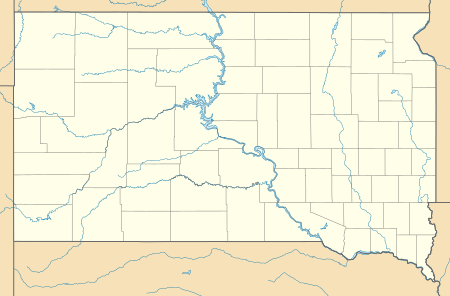Mitchell Municipal Airport
Mitchell Municipal Airport (IATA: MHE, ICAO: KMHE, FAA LID: MHE) is three miles north of Mitchell, in Davison County, South Dakota.[1] The National Plan of Integrated Airport Systems for 2011–2015 categorized it as a general aviation airport.[2]
Mitchell Municipal Airport Mitchell Army Airfield | |||||||||||||||
|---|---|---|---|---|---|---|---|---|---|---|---|---|---|---|---|
 USGS 2006 orthophoto | |||||||||||||||
| Summary | |||||||||||||||
| Airport type | Public | ||||||||||||||
| Owner | City of Mitchell | ||||||||||||||
| Serves | Mitchell, South Dakota | ||||||||||||||
| Elevation AMSL | 1,304 ft / 397 m | ||||||||||||||
| Coordinates | 43°46′29″N 098°02′19″W | ||||||||||||||
| Map | |||||||||||||||
 MHE | |||||||||||||||
| Runways | |||||||||||||||
| |||||||||||||||
| Statistics (2011) | |||||||||||||||
| |||||||||||||||
History
Opened in November 1937, the facility was rebuilt in 1943 by the United States Army Air Forces as a Second Air Force B-17 Flying Fortress and B-24 Liberator heavy bomber training airfield field known as Mitchell Army Airfield.
From July to late September, 1943, the 700th Bomb Squadron of the 445th Bomb Group conducted their advanced training at Mitchell Army Air Field. Upon completion of training and subsequent notification for overseas deployment, the 700th Bomb Squadron flew to Lincoln Army Air Field for last minute aircraft modifications before taking the Southern Atlantic crossing route to Tibenham, England.[3]
On October 1, 1944, when training ended at the facility, it was transferred to Air Technical Service Command where it was assigned to Ogden Air Service Command as an auxiliary airfield. It was turned over to civil use after the war.
Airline flights began about 1951: Midwest Airlines Cessna 190s. Braniff stopped at Mitchell 1952–59; North Central arrived in 1959 and successor Republic left in 1982. (Northwest Airlink pulled out in 1991.)
Facilities
The airport covers 1,376 acres (557 ha) at an elevation of 1,304 feet (397 m). It has two asphalt runways: 12/30 is 6,700 by 100 feet (2,042 x 30 m) and 17/35 is 5,513 by 100 feet (1,680 x 30 m).[1]
In the year ending August 10, 2011 the airport had 19,450 aircraft operations, average 53 per day: 95% general aviation, 4% air taxi, and 1% military. 29 aircraft were then based at this airport: 79% single-engine and 21% multi-engine.[1]
References
- FAA Airport Master Record for MHE (Form 5010 PDF). Federal Aviation Administration. Effective April 5, 2012.
- "2011–2015 NPIAS Report, Appendix A" (PDF). National Plan of Integrated Airport Systems. Federal Aviation Administration. October 4, 2010. Archived from the original (PDF, 2.03 MB) on September 27, 2012. External link in
|work=(help) - Simpson, Mike. History of the 445th Bomb Group, Revised Edition.

- Shaw, Frederick J. (2004), Locating Air Force Base Sites History's Legacy, Air Force History and Museums Program, United States Air Force, Washington DC, 2004.
External links
- Aerial image as of October 1997 from USGS The National Map
- FAA Terminal Procedures for MHE, effective August 13, 2020
- Resources for this airport:
- FAA airport information for MHE
- AirNav airport information for KMHE
- ASN accident history for MHE
- FlightAware airport information and live flight tracker
- NOAA/NWS weather observations: current, past three days
- SkyVector aeronautical chart, Terminal Procedures
